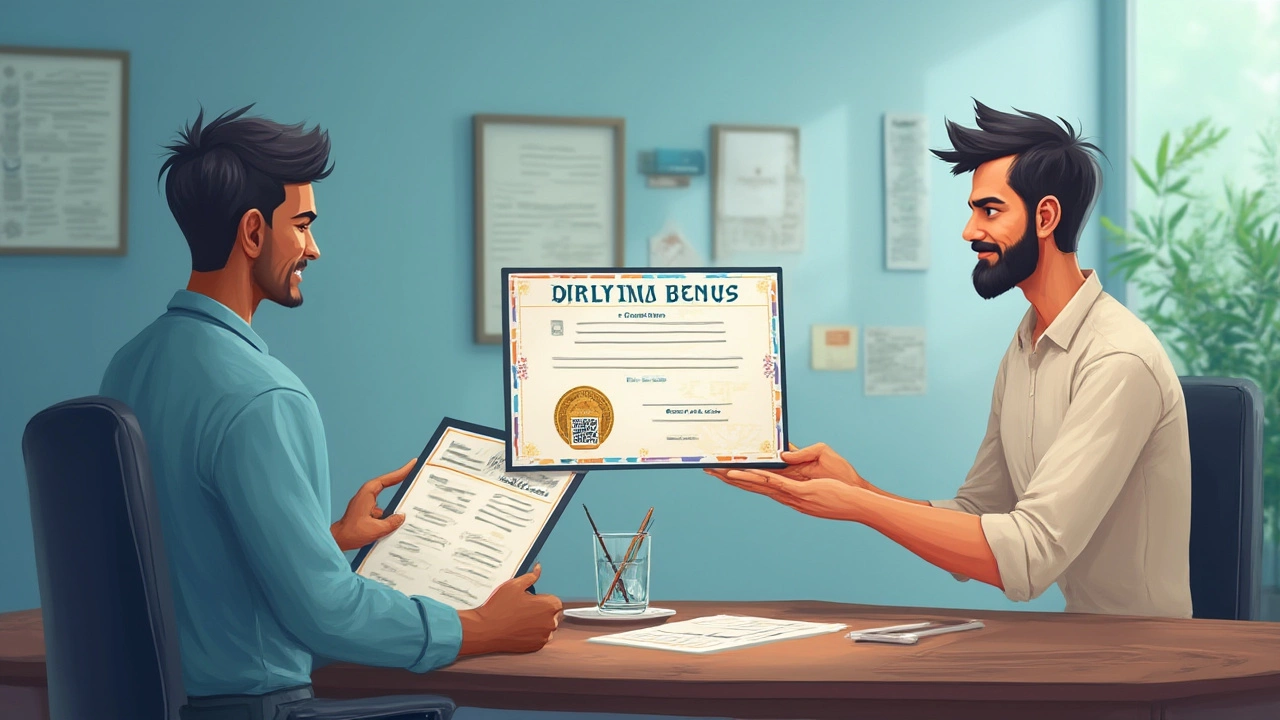Picture this: you finish an online diploma after months of burning the midnight oil. Then someone drops the dreaded question—'But is it actually valid in India?' For years, this doubt has hovered around online learning. Is it just a piece of digital paper, or does it truly open doors? Trust me, the difference isn’t just about sitting at a classroom desk versus your kitchen table—it's in the details that can change your career path overnight.
What Makes a Diploma 'Valid' in India?
The term 'valid' is thrown around a lot, but what does it really mean? In India, a diploma is legally valid if it's awarded by an institution approved by a government-regulating body—think AICTE, UGC, or state technical boards. For online diplomas, especially after the COVID-19 revolution, the rules have gotten both stricter and more accommodating. The University Grants Commission (UGC), which governs higher education in India, officially allowed recognized universities to offer online degree and diploma programs back in 2018, but real momentum built during the lockdown days. By 2021, UGC actually released a list of universities allowed to offer online courses—Delhi University, Amity University, and IGNOU are a few names you’ll spot there. If the institution is on this list or is a known, approved university, that online diploma can stand tall with its offline counterpart.
Private institutes also jumped into the fray, promising 'job-ready' diplomas. Here's the catch: private institutions that aren’t UGC or AICTE approved can issue certificates, but those certificates might not hold much water for higher studies or competitive government jobs. So, if you’re thinking long-term—like cracking UPSC or government recruitments—stick with programs that have official approval. The government even rolled out the Academic Bank of Credits in 2021, a digital wallet for your credits from different programs. If your diploma’s credits can be stored there, that’s another tick in the 'valid' box.
Another fact: Some fields have additional layers of scrutiny. Nursing, pharmacy, and legal studies are only valid from institutes recognized by the MCI, PCI, or BCI, respectively. If your online diploma is in, say, hospital management but not from a healthcare-recognized institution, no hospital will take it. So, always check the specific regulator before you sign up.
The Role of UGC, AICTE, and Other Regulatory Bodies
The UGC is the main watchdog for most universities. It maintains an updated portal that lists institutions allowed to run online and distance learning programs. If the university isn’t on that list, its diploma will likely get rejected in job or government circles. AICTE steps in for technical or engineering diplomas. In 2020, AICTE issued a warning—technical courses like engineering or architecture offered online by unapproved institutions? Not valid. NIOS, the National Institute of Open Schooling, is accepted for school-level diplomas, and the All India Council for Technical Education blueprint clearly draws a line between what’s valid and what’s not.
What about foreign universities? There's a growing trend to offer online diplomas from overseas, but Indian employers and universities don’t always recognize them unless the degree is 'equivalent' as per the Association of Indian Universities (AIU). The government even rejected some popular 'distance MBAs' offered from the UK, USA, and Australia for not meeting the AIU standards. So, always check with the AIU if you’re investing big money in foreign diplomas.
One more thing: The government releases lists of 'fake institutions' every year. As of 2025, UGC’s list includes names still tricking hopefuls with fancy websites and tall promises. Steer clear of places whose names sound suspiciously like famous universities—this is a classic red flag. Trust the official UGC and AICTE portals, not just attractive advertising.

Are Online Diplomas Accepted for Jobs and Further Studies?
Here's where reality cuts through hype. For jobs in the private sector, recruiters often focus on skills, performance, and portfolio. If you earn an online diploma in digital marketing from a UGC-approved university, you’re as likely to get an interview call as someone who sat in a brick-and-mortar classroom. For IT and software jobs, practical skills matter even more—companies like Infosys, Wipro, and TCS have publicly mentioned skills and projects trumping the mode of learning.
But if you dream of pursuing higher studies—like enrolling in a master's course later on or sitting for competitive government exams—your original diploma must be recognized. As of 2025, almost all Indian universities accept diplomas earned online, as long as they're from UGC-approved institutions. State selection boards, UPSC, SSC, and other bodies also usually accept such programs, but only when they’re on the official approval lists. Some high-profile government jobs still have a soft spot for full-time degrees, so double-check eligibility requirements.
Now, for international studies or migration, Indian online diplomas face mixed reactions. Countries like Canada and Australia mostly want proof it’s approved in India and recognized by the AIU. Some embassy staff have been known to call the university directly and check, so keep your documentation handy.
How to Spot a Legit and Recognized Online Diploma Course
Now for the million-rupee question: how do you spot a legit program among a sea of dodgy options? Start by going straight to the UGC's official website. They publish an updated list of all universities permitted to offer online and distance courses. The AICTE site does the same for technical diplomas. If your course isn’t on those lists, walk away—no matter how tempting the sales pitch sounds.
Another tip—look for a Course Approval Letter. Reputed universities mention this in their admission material or will provide if you ask. Check the institution's NAAC grade too; B+ or above means they're playing by the book. Cross-check accreditation logos like AICTE, UGC, or DEB on the official government portal (don't trust just the website's claim). If you’re dealing with an international online diploma, visit the AIU portal to check foreign degree equivalence.
- Stick to universities with UGC, AICTE, or state board approval
- Peek at the accreditation (NAAC grades matter)
- Check for a government-issued approval letter for the specific diploma
- For foreign certificates, verify with the Association of Indian Universities
- Read the fine print—some approvals are only for “degree” not “diploma” courses
- Look out for scammy names or websites with lots of spelling mistakes
- Check student reviews on trusted educational forums
On top of this, smart students ask employers or universities directly if the diploma will be recognized. Some HR departments even keep lists of pre-approved institutions. If you're aiming for a government job, scan through the latest notifications to check their diploma requirements—these rules change fast.

Why Online Diplomas Matter More Than Ever in 2025
Here’s an eye-opener: Since the 2020 lockdowns, online enrollments for diploma programs have tripled. By early 2025, 34% of new diploma registrations in India came from online platforms, a jump from just 7% a decade ago. India’s new National Education Policy (NEP 2020) set the stage for online learning, aiming to get 50% of college learners into higher education by 2035. The boom in online diplomas isn’t just about convenience—it's opening doors for millions who can’t relocate or attend classes in person.
Employers today are less suspicious of online diplomas than ever. Tata, Mahindra, and even major government PSUs now run upskilling programs partly online, and they happily accept UGC-approved online diplomas on CVs. Also, for those living in far-flung corners—think small towns in Assam or Rajasthan—online diplomas are often the only way to get specialized skills without uprooting your whole life.
Still, the onus is on you to pick a course that carries weight. With the government's crackdown on dubious online institutions and regular publication of 'fake' college lists, the risks are lower than in the past. Solid knowledge, hands-on skills, and a recognized diploma are what recruiters now look for—how you earned them is less important than whether they're real, approved, and up to industry standards.
At the end of the day, in 2025, a valid online diploma in India is not only possible but practical—just mind the approvals, ask questions, and double-check before you click 'pay fees'. Your future self will thank you.
